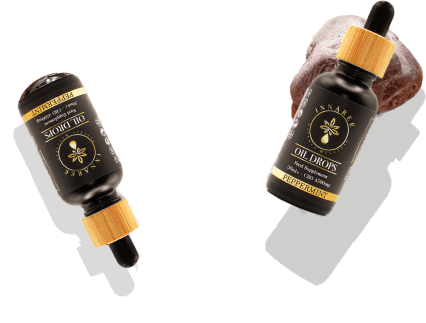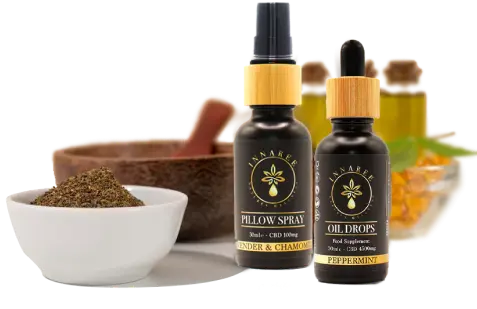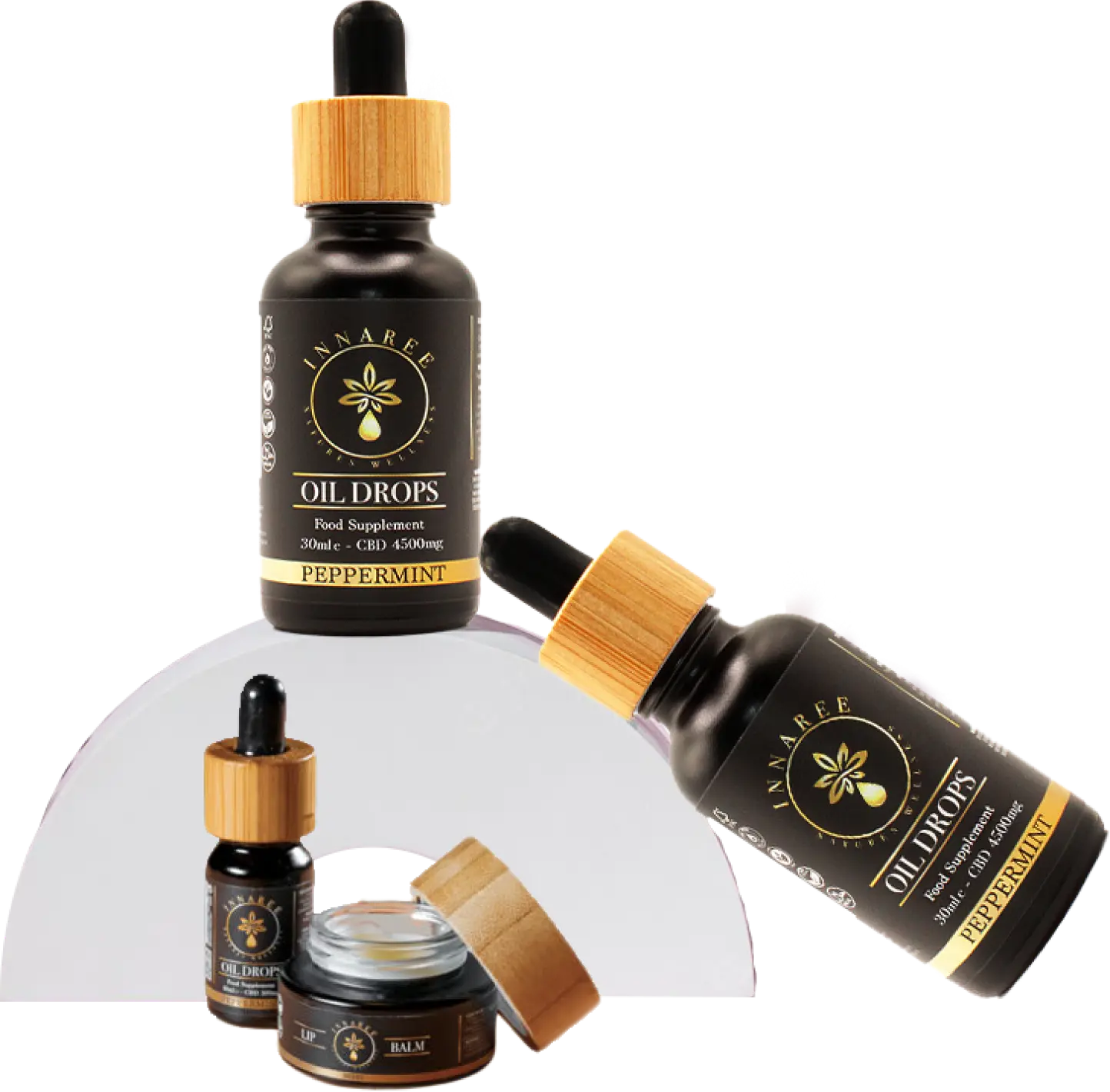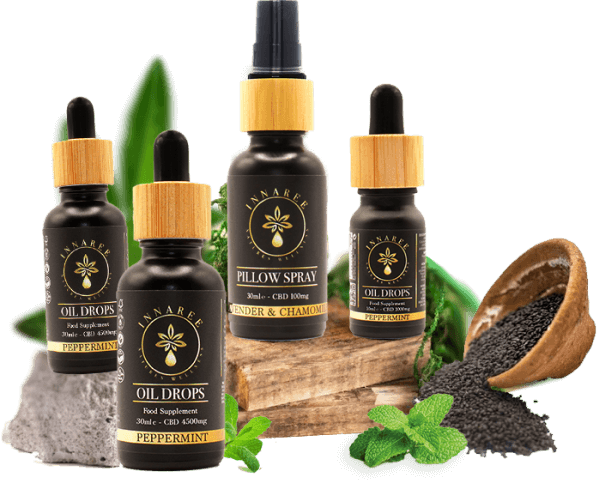- Home /
- FAQ

Looking to find out more about CBD and also why Innaree CBD is unique? Read our detailed FAQ for answers to frequently asked questions. We also give suggestions of how to take your CBD and some possible ways to set up a daily routine.
Looking to find out more about CBD and also why Innaree CBD is unique? Read our detailed FAQ for answers to frequently asked questions. We also give suggestions of how to take your CBD and some possible ways to set up a daily routine.
About CBD

What is CBD?
What is CBD?
CBD is short for cannabidiol, a compound found in the cannabis plant. It is one of over a hundred (113 to be exact) different cannabinoids that have been identified to-date ever since its discovery.
The CBD compound has a wide range of potential benefits, especially helpful for stress, anxiety, depression, epilepsy, pain, and inflammation. What is equally interesting is that the human body also produces its own endogenous cannabinoids. The endogenous cannabinoid system within all of us is one of the most important physiologic systems involved in establishing and maintaining human health. Endocannabinoids and their receptors are found throughout the body: in the brain, organs, connective tissues, glands, and immune cells.
It is for this reason that taking CBD as part of a healthy lifestyle can be so good for us. We will revisit the endogenous cannabinoid system later on in more detail for anyone who wants to know more.
Is CBD Oil Legal?
In the UK, CBD oil is legal as long as it meets certain requirements. The CBD oil must be derived from an industrial hemp strain that is EU-approved and contains no more than 0.2% THC (the psychoactive compound found in marijuana). Additionally, the product must not be marketed as a medicine and cannot make any medical claims. However, CBD oil products that do not meet these requirements may be illegal in the UK. It’s important to purchase CBD products from reputable sources such as Innaree that can provide proof of their compliance with UK regulations. You will also be happy to know that Innaree CBD is has 0.0% THC. It’s also worth noting that the legal status of CBD oil is subject to change and may vary in different regions and countries. It’s always a good idea to stay up-to-date with the latest regulations and consult with legal experts if necessary.
Is CBD Halal?
How do I take CBD Oil?
So now you know what CBD is and where it’s produced from, the next question you may have is “How do I take my CBD for the best results”? One of the most common and hence best ways to take CBD is orally, and the best way to do this is via CBD oil drops or sprays. We at Innaree believe the administering of CBD ‘drops’ provide little to no wastage since you have more control of where you place the drops, as opposed to sprays, hence all of our CBD oils come in drops format. Have a look at the Innaree Oil drops for more details and discover what suits you. CBD oil is best applied under the tongue (also known as sublingually) as that is the quickest way for the oil to enter the body via the receptors and blood vessels located under the tongue, and importantly to allow for the highest effective percentage of CBD into the body. Place the CBD oil under the tongue for anything between 60-90 seconds for the best results (it doesn’t matter if you go over the suggested time a little). The effects of our CBD last up to 6 hours. Knowing this information will hopefully help you to plan how you want to take your Innaree CBD Oil drops. You can either take your daily desired dosage all in one serving or break it up throughout the day thereby receiving the benefits of CBD for a longer duration. Finally, just to let you know, at Innaree after testing a wide range of flavours, over 99% of our testers found the peppermint to be the best and most subtle flavour. We have listened to our testers and as a result, all our CBD oils come with the very same peppermint flavour, no matter what size or dosage you select. Click here to view how to take CBD.
How Long Does It Take For CBD to Work?
CBD oil is best applied under the tongue (also known as sublingually) as that is the quickest way for the oil to enter the body via the receptors and blood vessels located under the tongue, and importantly to allow for the highest effective percentage of CBD into the body. Place the CBD oil under the tongue for anything between 60-90 seconds for the best results (it doesn’t matter if you go over the suggested time a little). The effects of our CBD last up to 6 hours. Knowing this information will hopefully help you to plan how you want to take your Innaree CBD Oil drops. You can either take your daily desired dosage all in one serving or break it up throughout the day thereby receiving the benefits of CBD for a longer duration. Finally, just to let you know, at Innaree after testing a wide range of flavours, over 99% of our testers found the peppermint to be the best and most subtle flavour. We have listened to our testers and as a result, all our CBD oils come with the very same peppermint flavour, no matter what size or dosage you select.
Why is Innaree CBD Less Expensive Than Other Brands?
CBD Usage and Dosage

What's the right amount of CBD to take?
The right amount of CBD to take can vary depending on the individual and the condition being treated. It is generally recommended to start with a low dose and gradually increase it until the desired effect is achieved.
It is also important to consult with a healthcare professional before starting any new supplement regimen, including CBD. They can help determine the appropriate dosage for you based on your specific needs and medical history.
How long does CBD stay in your system?
The length of time that CBD stays in the body can vary depending on a number of factors, such as the person’s metabolism, the amount consumed, and the frequency of use. Generally, CBD is thought to have a relatively short half-life, meaning that it is metabolized and eliminated from the body relatively quickly.
On average, CBD can stay in the body for around 2 to 5 days. However, in heavy and chronic users, it can stay up to a week or more. Factors like the consumption method and the CBD product used will also play a role in the duration of time it stays in the body. Keep in mind that this is an approximation and it may vary from person to person.
It’s important to note that CBD can be detected in drug tests, so it’s always best to check with your employer or the organization administering the test if you have any concerns about using CBD and the potential for it to show up on a drug test
I'm a professional athlete, can I use CBD?
As a professional athlete, it is important to be aware of the rules and regulations regarding the use of CBD and other supplements. While the World Anti-Doping Agency (WADA) removed CBD from its list of prohibited substances in 2018, some sports organizations and athletic associations may have their own policies in place.
CBD is not considered as a prohibited substance by the World Anti-Doping Agency (WADA) and is legal to use for professional athletes. However, it is important to check with the specific sports organisation or athletic association that you are affiliated with to ensure that its use is allowed under their rules and regulations. Some organisations may have specific guidelines or policies regarding the use of CBD, so it is important to be aware of these before using it.
It’s always best to consult with your doctor, sports physician or sports organisations for guidance about using CBD or any other supplement during training, competition or recovery.
How old do you have to be to take CBD?
The legal age for purchasing and consuming CBD can vary depending on the laws in your country or state.
In the United Kingdom, CBD is legal to purchase and consume for individuals of all ages, however, it’s important to note that the regulation and quality of CBD products may vary. It’s always best to consult with a healthcare professional before giving CBD to a child or teenager.
In the United States, CBD is not a controlled substance and is legal to purchase and consume for individuals of all ages. However, it is important to note that the FDA has not yet approved CBD for use in children, and it is not recommended for children under the age of 18 without the guidance of a healthcare professional.
In Canada, CBD is legal to purchase and consume for individuals over the age of 18. However, CBD products containing more than 0.3% THC are only legal for adults (19 years or older) in certain provinces and territories.
In Australia, CBD is legal to purchase and consume for individuals over the age of 18, but it is important to note that the regulation and quality of CBD products may vary.
It’s always best to consult with a healthcare professional before giving CBD to a child or teenager, and also to check with local laws and regulations.
What's the best way to store CBD?
CBD is best stored in a cool, dry place away from direct sunlight and heat. This helps to preserve the integrity of the CBD oil and to prevent it from degrading or losing potency over time.
The ideal storage temperature for CBD products is around 15-20°C (59-68°F). Exposure to high temperatures, humidity or direct sunlight can cause the CBD oil to degrade over time, reducing its effectiveness.
It’s also best to store CBD products in airtight containers to protect them from exposure to oxygen, which can also cause the oil to degrade.
It’s also important to note that CBD products should be stored in a place that is out of reach of children and pets, and keep in mind that some CBD products may be flammable.
Additionally, it’s a good idea to check the expiration date of the CBD product before consuming it, and if you notice any changes in color, smell, or consistency, it is best to discard it.
Can I pray Salah whilst using CBD?
Islamic teachings prohibit the consumption of any intoxicants, including alcohol and drugs, as it is considered haram (forbidden) and can impair one’s ability to perform their religious duties and make sound decisions.
It is important to check the THC content of the CBD product you are using and ensure that it is below the legal limit of 0.3% as per the laws of your country. If the product contains more than 0.3% THC, it can have psychoactive effects and may be considered haram. All Innaree CBD products contain 0.0% THC and are therefore deemed safe to use and do not conflict with making prayers or ritual impurity.
It is also recommended to consult with a Muslim religious authority or a qualified Islamic scholar for guidance on this matter and any other religious concerns to be sure.
Medical & Health

Can you take CBD with Antibiotics?
Inflammation is part of the process that leads to many diseases, including coronary heart disease, high blood pressure and stroke, and there is some evidence that CBD has anti-inflammatory properties.
Other studies have suggested that CBD can have a protective effect on the heart: this has been proven in rats after a heart attack and in mice with some of the heart damage associated with diabetes. But because these studies are often based on findings in a lab or in animals, not in humans, we cannot yet be confident that CBD will benefit the human heart
Can CBD help the heart?
CBD oil can potentially interact with some medications, including antibiotics. CBD can affect the way the body metabolizes certain drugs, which can increase or decrease their effectiveness or cause side effects.
It is generally recommended to talk to a healthcare professional before starting to take CBD oil while taking antibiotics. The healthcare professional will be able to advise whether or not it is safe to do so and will be able to advise on the appropriate dosage.
CBD oil can also interact with other medications, including blood thinners, antidepressants, and anti-anxiety medications, so it’s important to let your healthcare professional know about all the medications and supplements you are taking before starting to use CBD oil.
In general, it’s best to avoid taking any supplements or medications without consulting with a healthcare professional, as they may interact with other medications you’re taking or have other side effects.
Why is CBD oil now in beauty products?
Emerging research suggests that CBD oil may have a positive impact on various skin conditions such as acne, dermatitis, and psoriasis. Additionally, CBD is believed to have antioxidant properties that protect skin cells from harmful free radicals.
However, it is important to note that the scientific community is still in the early stages of understanding the full benefits of CBD oil.
Can CBD be used to treat pain symptoms?
Studies conducted in the United States have also shown that CBD is effective in managing chronic non-cancer pain. A 2020 study applied CBD topically to patients with a condition called peripheral neuropathy, which causes nerve damage in the hands and feet.
The study found that patients who used the topical CBD experienced a significant reduction in sharp and intense pain, as well as cold and itchy sensations, compared to those who used a placebo. No adverse side effects were reported. When applied topically, CBD oil does not have a systemic effect and treats pain in a specific area, which may make its effects more pronounced.
How does CBD ease diabetic complications?
Research on human cells has shown that CBD may help to mitigate the effects of high glucose levels on other cells in the body, which can lead to the development of diabetes and its related complications. Studies suggest that with further research, CBD may have potential benefits for patients with diabetes, diabetic complications, and plaque buildup in artery walls.
A small study involving 13 patients with type 2 diabetes who were not taking insulin found that when given CBD, the patients showed decreased levels of resistin (a hormone that causes resistance to insulin) and increased levels of glucose-dependent insulinotropic peptide (a hormone that helps regulate insulin levels in response to food consumption) compared to their baseline levels before the study. These results suggest that CBD may have potential as a natural treatment for diabetes by helping to regulate insulin-related hormone levels.
